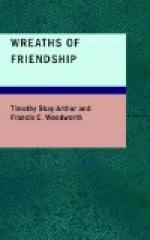I never shall forget what a sensation it used to produce in our family, years ago, when the newspaper came. We children—there were three of us, one brother and two sisters—used to watch for the post, on the all-important day, as anxiously as a cat ever watched for a mouse. Peter Packer, the bearer of these weekly dispatches, deserves a little notice. He was a queer man, at least he had that reputation in our neighborhood. As long as I can remember, he went his rounds; and, for aught I know, he is going to this day.
Peter’s old mare—she must be mentioned, for the two are almost inseparable—was as odd as he was. I should think she belonged to the same general class and order with Don Quixote’s renowned Rosinante; but she had one peculiarity which is not put down in the description of Rosinante, to wit, the faculty of diagonal or oblique locomotion. This mare of Peter’s went forward something after the manner of a crab, and a little like a ship with the wind abeam, as the sailors say. It was a standing topic of dispute among us boys, whether the animal went head foremost or not. But that did not matter much, so that she made her circuit—and she always did, punctually; that is, she always came some time or another. Sometimes she was a day or two later than usual; but this never occurred except in the summer season, and it was in this wise: she had a most passionate love for the practical study of botany; and not being allowed, when at home, to pursue her favorite science as often as she wished, owing partly to a want of specimens, and partly to her master’s desire to educate her in the more solid branches, she frequently took the liberty to divest herself of her bridle, when standing at the door of her master’s customers, and to gallop away in search of flowers. She was a great lover of botany, so much so, that, as I said before, her desire to obtain specimens sometimes interfered a little with her other literary engagements; and I am sure I can forgive her—
“For e’en her failings leaned to virtue’s side.”
Just so it was with Peter himself. No storm, or tempest, or snow-bank, could detain him—that is, not longer than a day or two—in his weekly round. But he loved the theory of making money as much as his mare loved botany; and he was a practical student, too, and the road which he traveled afforded a good many opportunities both for extending his knowledge of that science and of practically applying his principles. So, between the two, our newspaper sometimes got thoroughly aired before it came to the house. But Peter was punctual—I insist upon it—for he always came some time or another.
When the paper did come, we literally devoured its contents. With us it was an oracle. If the “Courier” affirmed or denied a thing, that was enough for us. It was an end to all debate. How confiding children are! He who has read “Robinson Crusoe” when a boy, finds it almost impossible to regard it a fable when he is a man. The newspaper, that makes its weekly visit to the family circle in the country, leaves the marks of its influence upon the mind and the morals of the child. It forms his tastes and controls his character. How careful, then, should parents be, in the selection of periodicals to be the companions of their children.




